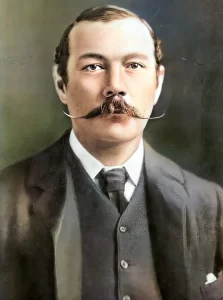Sir Arthur Conan Doyle, born on May 22, 1859, in Edinburgh, Scotland, was a renowned British writer and physician, best known for creating the iconic detective Sherlock Holmes. His works have left an indelible mark on the mystery and detective fiction genres.
Early Life and Education
Doyle was born to Charles Altamont Doyle and Mary Foley, both of Irish Catholic descent. He received his early education at Jesuit institutions, including Hodder Place and Stonyhurst College, and later attended the University of Edinburgh Medical School. It was during his medical studies that Doyle began writing short stories, marking the inception of his literary journey.
Literary Career and the Birth of Sherlock Holmes
While practicing medicine, Doyle ventured into writing. His first significant work featuring Sherlock Holmes and Dr. Watson, “A Study in Scarlet,” was published in 1887. This novel introduced readers to the brilliant detective and his methodical approach to solving crimes. Holmes was partially modeled after Doyle’s former university teacher, Joseph Bell, known for his keen observational skills.
Notable Works
Doyle’s bibliography is extensive, but some of his most celebrated works include:
- “The Adventures of Sherlock Holmes” (1892): A collection of twelve short stories that solidified Holmes’s place in literary history.
- “The Hound of the Baskervilles” (1902): A novel that blends mystery with elements of the supernatural, showcasing Doyle’s storytelling prowess.
- “The Sign of the Four” (1890): The second novel featuring Holmes and Watson, delving into a complex tale of love and betrayal.
- “The Lost World” (1912): An adventure novel introducing Professor Challenger, exploring a prehistoric world.
Beyond Sherlock Holmes
Although Sherlock Holmes brought him fame, Doyle’s literary contributions extended beyond detective fiction. He penned historical novels, science fiction, and plays. Notably, his Professor Challenger series, starting with “The Lost World,” showcased his versatility as a writer.
Personal Beliefs and Later Life
Later in life, Doyle became deeply interested in spiritualism, authoring works on the subject and delivering lectures worldwide. He also wrote “The Coming of the Fairies” (1922), expressing his belief in the existence of fairies, inspired by the Cottingley Fairies photographs.
Sir Arthur Conan Doyle passed away on July 7, 1930, in Crowborough, England. His legacy endures, with Sherlock Holmes remaining a timeless figure in literature and popular culture.
Some of the works of Arthur Conan Doyle that we will look at here are:
- Sherlock Holmes (All Novels and Stories)
- The Lost World
- The Poison Belt
- Sir Nigel
- Micah Clarke
- The Terror of Blue John Gap
For those interested in classic detective stories and the evolution of mystery fiction, exploring Doyle’s works offers invaluable insights into the genre’s foundations.

